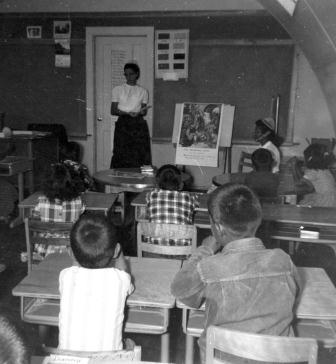The Michigan Supreme Court decision in Pfeiffer v. Board of Education, 118 Mich. 560 (1898), presents a bird’s eye view of developments within the states regarding religious exercises in public schools near the end of the nineteenth century, before the freedoms of the First Amendment were applied to the states.
Pfeiffer wanted to stop daily Bible readings in school
At issue was the constitutionality of the practice of the Detroit schools to read daily excerpts from Readings from the Bible. Conrad Pfeiffer sued in a circuit court in Wayne County, Michigan, asking the court to enjoin the board of education from allowing the Bible readings in public schools. The circuit court agreed with Pfeiffer and issued an injunction. The board of education appealed to the Michigan Supreme Court, which reversed.
Michigan Supreme Court upheld constitutionality of practice
Writing for the majority, Justice Robert Montgomery upheld the constitutionality of the practice under the state constitution. (The Court had not yet applied the First Amendment to the states.) He took “judicial notice” of what he believed to be half a century of practice sustaining such exercises. He noted that children whose parents opposed the practice were exempt and that the readings were not accompanied by specific religious teachings.
Dissenting opinion thought state constitution called for separation of church and state
In dissent, Justice Joseph Moore wrote a longer decision, much of which quoted from the lower court decision and some of which quoted from Board of Education of the City of Cincinnati v. Minor (Ohio S. Ct. 1872). Moore argued that historical practice was only helpful in cases where constitutional language was vague, and he thought it was clear that the state constitution called for separation of church and state.
Court has ruled that Bible reading in schools is unconstitutional
With the application of the provisions of the First Amendment to the states in the twentieth century, the U.S. Supreme Court has ruled that devotional prayer — Engel v. Vitale (1962) — and Bible reading — Abington School District v. Schempp (1963) — in schools are unconstitutional. As in Pfeiffer, however, the Court sometimes has cited historical practice to justify practices — for example, prayer before state legislatures as in Marsh v. Chambers (1983) — that it would probably have invalidated had it applied the three-part Lemon test that it often applies in establishment clause cases.
John Vile is a professor of political science and dean of the Honors College at Middle Tennessee State University. He is co-editor of the Encyclopedia of the First Amendment. This article was originally published in 2009.

